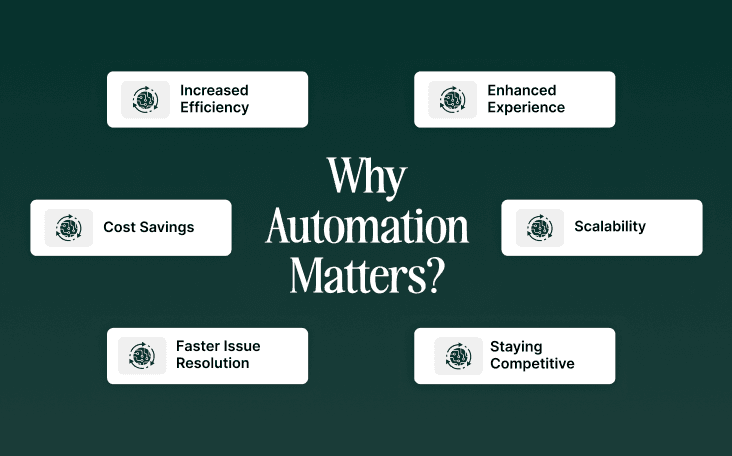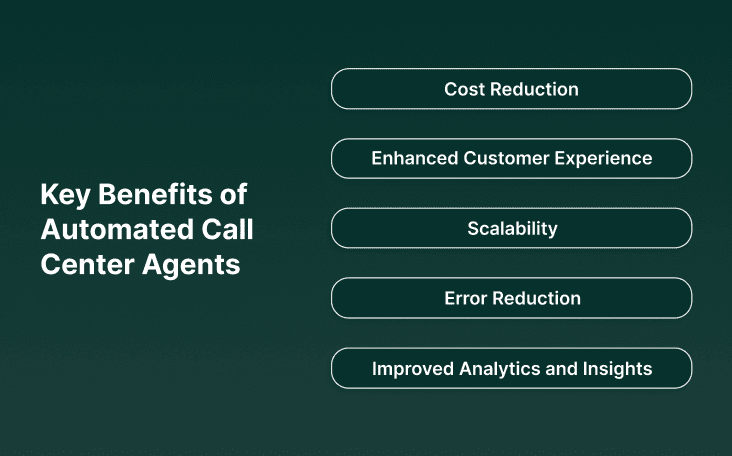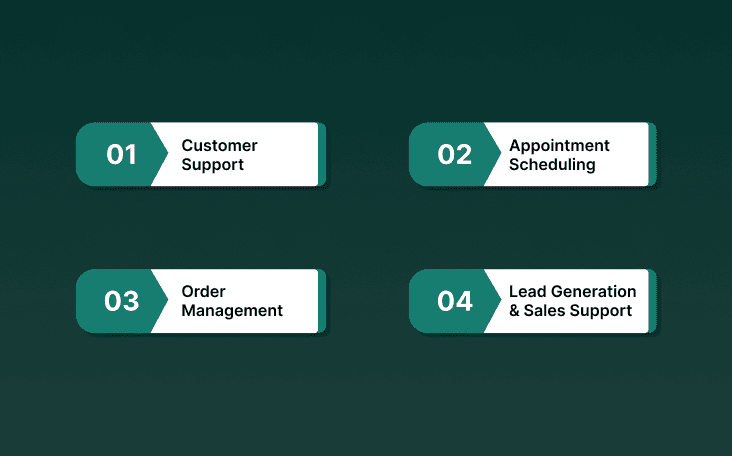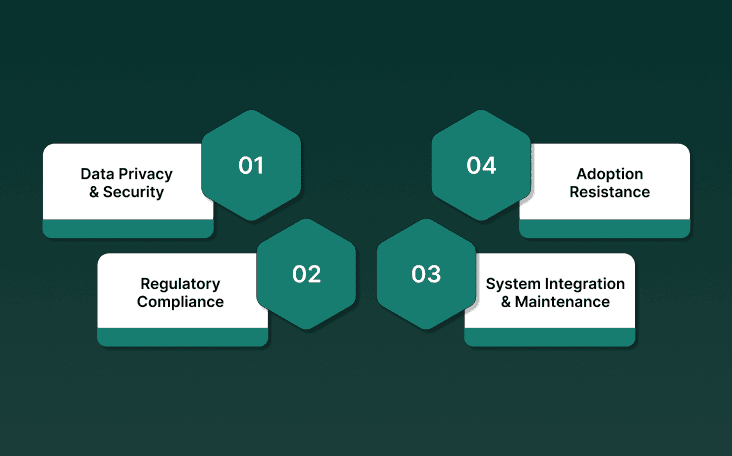Explore how automated call center agent solutions improve efficiency, enhance customer service, and reduce costs. Learn about key benefits and use cases.

Akshat Mandloi
Updated on
December 26, 2025 at 11:28 AM

Customer service is under pressure like never before. As expectations rise, businesses are struggling to deliver fast, efficient, and personalized support, often resulting in long wait times, frustrated customers, and overburdened agents. The challenge of managing high call volumes while maintaining service quality has become a significant issue for many organisations.
This is where automated call center agents can make all the difference. By using AI technology, businesses can handle customer inquiries 24/7, reduce wait times, and ensure a consistent experience every time. Research from ResearchGate reveals that AI-powered chatbots and voice assistants are driving significant improvements in customer service efficiency, allowing businesses to automate repetitive tasks and provide quicker, more reliable responses.
Where speed and accuracy are paramount, automated call center agents have become an essential tool for businesses aiming to meet the ever-growing demands of their customers.
Key Takeaways
AI-driven Efficiency: Automated call center agents using AI and machine learning to handle high volumes of customer interactions, improving response times and reducing operational costs.
Enhanced Customer Experience: With 24/7 availability and faster issue resolution, AI agents ensure personalized and consistent support, meeting the growing demand for instant service.
Scalability and Cost Savings: Automation allows businesses to scale their operations without increasing staff, leading to significant savings in labor and training costs.
Advanced Technologies: Natural Language Processing (NLP), voice recognition, and speech analytics power automated agents to provide accurate, empathetic responses and improve customer satisfaction.
What is an Automated Call Center Agent?
An automated call center agent is an AI-powered tool that manages customer interactions without human involvement. Using AI and machine learning, it performs tasks like answering calls, providing information, and processing requests. These agents interact with customers via voice or text, handling FAQs, scheduling appointments, and processing orders. By automating routine tasks, businesses can efficiently manage higher call volumes, reduce wait times, and enhance customer experience.
Why Automation Matters in Call Centers

Automation is reshaping the call center industry by addressing several operational challenges. Here’s why automation is essential:
1. Increased Efficiency:
Automated agents can handle a high volume of customer interactions simultaneously, which allows businesses to manage more calls without expanding their workforce. This results in quicker response times and a more streamlined operation.
2. Enhanced Customer Experience:
With the help of conversational AI, automated agents can provide fast, accurate responses 24/7. Research shows that 88% of customers expect self-service options such as chatbots when engaging with businesses online, meeting their demand for quick, efficient service.
3. Cost Savings:
Automation reduces the need for human agents to handle repetitive tasks. This results in lower operational costs and the ability to allocate human resources to more complex issues that require specialized knowledge.
4. Scalability:
As customer demand grows, automation allows businesses to scale their operations without the need for proportional increases in staff. Automated systems can handle larger volumes of inquiries, ensuring that service quality remains high even during peak times.
5. Faster Issue Resolution:
Automated agents help improve First Call Resolution (FCR) rates by quickly addressing simple inquiries or providing solutions through voice bots. This leads to higher customer satisfaction and greater efficiency.
6. Staying Competitive:
AI is expected to automate 95% of customer interactions by 2025. Adopting automation now will help businesses remain competitive and future-ready as customer expectations evolve and demand for fast, accurate service increases.
Adopting automated call center agents is a strategic investment that not only improves operational efficiency but also enhances customer experience and reduces costs. By automating routine tasks, businesses can better allocate resources to more complex issues, ensuring they remain competitive in the rapidly changing market.
Also Read: How AI is Transforming Call Center Roles in 2025
Technology Behind Automated Call Center Agents

Using advanced technologies, these systems can deliver faster, more efficient, and consistent support while reducing the reliance on human intervention. Below are the key technologies that enable automated call center agents to operate effectively:
1. Natural Language Processing (NLP)
Natural Language Processing (NLP) is fundamental to the way automated call center agents understand and interpret customer queries. It allows the system to process human language, whether spoken or written, and respond appropriately.
Understanding Natural Language: NLP enables the agent to interpret not only the words used but also the context and intent behind the customer's message.
Handling Various Inquiries: From basic FAQs to complex troubleshooting, NLP allows the agent to handle a broad range of requests without human involvement.
Seamless Interaction: By processing language naturally, NLP ensures that customers can interact with the agent as if they were speaking to a human representative.
With NLP, automated call center agents provide customers with smooth, conversational experiences that help resolve issues quickly and efficiently.
2. AI & Machine Learning
Artificial Intelligence (AI) and machine learning are vital for improving the performance of automated call center agents. These technologies enable the agents to continuously learn from past interactions and become more effective over time.
Continuous Learning: As the agent interacts with more customers, machine learning algorithms analyze these conversations to identify patterns and improve future responses.
Enhanced Efficiency: Over time, the agent’s responses become more accurate and context-aware, ensuring quicker resolution of customer issues.
Personalization: AI allows the agent to tailor its responses to individual customers, offering more personalized experiences with each interaction.
The power of machine learning ensures that the agent improves its accuracy and efficiency as it gains more experience, reducing the need for human intervention.
3. Voice Recognition and Speech Analytics
Voice recognition and speech analytics are essential for enabling automated agents to understand not only what customers are saying but also how they are saying it. These technologies provide deeper insights into customer sentiment.
Voice Recognition: This technology allows the agent to accurately transcribe and interpret spoken words, ensuring no details are missed during the interaction.
Speech Analytics: Beyond basic transcription, speech analytics analyzes the tone, pace, and emotion in a customer's voice, helping the agent understand their sentiment.
Improved Customer Experience: By recognizing frustration or satisfaction, the agent can adjust their response accordingly, whether by changing tone, offering empathy, or escalating to a human agent if needed.
With voice recognition and speech analytics, automated agents can provide more accurate responses and deliver a more empathetic, human-like experience.
Automated call center agents powered by these technologies can handle a wide variety of customer interactions more efficiently and with greater accuracy. As AI continues to evolve, these systems will become even more advanced, delivering increasingly personalized and context-aware service.
Also Read: How AI is Transforming Call Center Operations
Key Benefits of Automated Call Center Agents

Automated call center agents are revolutionizing customer support by combining advanced AI technology with operational efficiency. Here are five key benefits that businesses can enjoy by adopting these solutions:
1. Cost Reduction
Automated call center agents help businesses significantly reduce operational costs. By managing routine tasks like answering common queries, appointment scheduling, and basic troubleshooting, AI reduces the need for a large workforce. This leads to savings on staffing, training, and overhead costs while ensuring tasks are handled efficiently.
Decreases labor costs: With AI handling repetitive tasks, businesses need fewer human agents, saving on salaries and training expenses.
Optimizes workforce utilization: Human agents can focus on more complex queries, leading to better resource allocation.
2. Enhanced Customer Experience
AI-powered call center agents improve customer satisfaction by offering quicker response times and round-the-clock availability. Customers can reach out at any time and get instant assistance, which helps enhance their overall experience. Personalized interactions based on customer data further make the experience feel tailored and relevant.
Faster issue resolution: Automated agents provide instant responses, reducing wait times.
24/7 availability: Customers get consistent support no matter the time of day or week.
3. Scalability
Automated agents offer scalability without the need to hire additional staff. When call volumes rise, AI can easily manage the increased load, ensuring that all customers are attended to promptly. This makes it easy for businesses to handle growth without the complexities of scaling their workforce.
Handles peak times: AI can manage sudden surges in call volume without compromising on service quality.
Efficient growth management: As businesses grow, automated agents ensure support remains seamless without added labor costs.
4. Error Reduction
Human agents are prone to errors, especially when performing repetitive tasks. Automated agents minimize mistakes by adhering to predefined scripts and processes. This increases accuracy in handling customer requests, ensuring that information is consistent and reliable.
Increases precision: AI follows consistent protocols, reducing the likelihood of errors.
Boosts customer trust: Accurate responses lead to greater customer confidence in your services.
5. Improved Analytics and Insights
Automated call center agents can provide detailed analytics and reporting. These insights help businesses track key performance indicators such as customer satisfaction, call resolution rates, and average handling times. By analyzing these metrics, companies can continuously improve their service strategies and identify areas for improvement.
Real-time data tracking: Automated systems generate valuable metrics that businesses can use to improve operations.
Data-driven decisions: With actionable insights, businesses can adjust strategies to better meet customer needs.
Adopting automated call center agents, businesses can achieve a combination of efficiency, cost savings, and improved customer satisfaction while positioning themselves for future growth.
Also Read: AI Call Centers vs. Human Agents: Finding the Ideal Balance in Customer Support
Key Use Cases of Automated Call Center Agents

Automated call center agents are revolutionizing customer interactions, streamlining processes, and improving operational efficiency. Below are the key use cases across various industries:
1. Customer Support
Automated agents in customer support are designed to handle frequently asked questions (FAQs), technical support, and issue resolution.
Handling FAQs: Automated agents provide instant responses to routine questions, such as business hours, product details, or service information. This reduces wait times and ensures customers get quick answers.
Technical Support: For more complex issues, AI agents can guide customers through troubleshooting steps, such as resetting passwords or diagnosing technical issues.
Issue Resolution: These agents are also programmed to handle common service issues, escalating more complex cases to human agents.
By automating these tasks, businesses reduce the strain on human agents, allowing them to focus on higher-level customer concerns. This improves both customer satisfaction and team efficiency. Forbes highlights that AI in customer communication enhances operational performance, leading to increased retention rates.
2. Appointment Scheduling & Reminders
Automated agents significantly improve appointment scheduling and reminders, particularly in industries like healthcare.
Efficient Booking: AI systems can manage the entire scheduling process, making it easier for customers to book appointments online or via phone.
Automated Reminders: These agents send timely reminders, reducing the number of missed appointments and enhancing customer engagement.
For healthcare providers, this results in lower administrative workload and fewer no-shows, contributing to more effective patient management. Additionally, patients experience a smoother process, improving satisfaction.
3. Order Management & Tracking
Automated agents are essential in order management and tracking within e-commerce.
Order Status Updates: AI systems provide real-time information on the status of orders, including shipping, delivery dates, and any delays.
Return Processing: Customers can easily inquire about returns and exchange policies through automated agents, streamlining the process.
Product Inquiries: AI agents handle product availability, stock levels, and pricing questions, providing customers with consistent and timely responses.
This reduces the workload for human agents and accelerates customer service, leading to better customer experience and fewer operational errors.
4. Lead Generation & Sales Support
Automated call center agents assist in lead generation and sales support, playing a vital role in the sales funnel.
Lead Qualification: AI agents engage with potential leads, gathering relevant information and qualifying them based on predefined criteria.
Sales Support: They also assist sales teams by providing valuable data on customer preferences, behaviors, and past interactions, helping sales staff focus on high-priority leads.
These AI-driven solutions also ensure that sales teams have the most up-to-date customer insights, enabling more effective sales strategies.
At Smallest.ai, AI voice agents are transforming recruitment by automating time-consuming tasks such as candidate screening, interview scheduling, and follow-ups. This allows HR teams to focus on high-value activities like strategic hiring and candidate engagement. Their platform, Atoms, enables recruiters to design fully personalized voice agents in minutes, integrating seamlessly with existing HR systems and providing real-time analytics to enhance the hiring process.
Challenges in Implementing Automated Call Center Agents

Implementing automated call center agents can provide numerous benefits, such as reducing operational costs and improving efficiency. However, businesses face several challenges when integrating this technology. Below are some key areas to consider:
1. Data Privacy & Security
One of the most important considerations when implementing automated call center agents is data privacy. With the rise in cyber threats, protecting sensitive customer data is essential. Non-compliance with data protection regulations like GDPR (General Data Protection Regulation) and CCPA (California Consumer Privacy Act) can lead to severe fines and damage a business's reputation.
What businesses must do:
Ensure automated systems meet data protection standards.
Safeguard customer data by using secure data transmission and storage practices.
Be transparent with customers about how their data will be used.
By adhering to these guidelines, businesses can mitigate risks associated with data breaches and stay compliant with legal requirements.
2. Regulatory Compliance
Automated call center agents must also comply with industry regulations. For example, in healthcare, AI solutions must meet HIPAA (Health Insurance Portability and Accountability Act) standards to ensure the privacy of patient information. Similarly, financial services businesses need to ensure that AI agents follow guidelines for handling sensitive financial data.
Why compliance matters:
Non-compliance can result in hefty penalties and loss of customer trust.
Industry-specific regulations require that AI solutions meet certain standards to protect sensitive data.
Ensuring that AI solutions align with legal and regulatory requirements not only avoids legal issues but also boosts customer confidence in the business.
3. System Integration & Maintenance
Integrating automated agents with existing call center systems can be a complex task. Many businesses rely on older, legacy systems that may not be compatible with modern AI technologies. This mismatch can lead to integration challenges and disruptions in service.
Key points to consider:
Thorough planning is necessary to ensure a smooth integration process.
Regular updates and maintenance are crucial to keep systems functioning optimally.
Ongoing support is required to ensure the AI system adapts to any changes in existing infrastructure.
Without proper integration and continuous maintenance, businesses risk facing operational disruptions that can affect their overall performance.
4. Adoption Resistance
Employee resistance is a significant barrier to adopting automated call center agents. Many workers fear that AI will replace their jobs, leading to anxiety about job security. However, automation is designed to assist, not replace, human agents.
How to overcome resistance:
Communicate the benefits of automation clearly, emphasizing how it can reduce mundane tasks and enhance customer service roles.
Provide proper training to help employees understand how automation can improve their work life, not replace it.
Ensure that employees are part of the process, allowing them to see firsthand how automation can make their jobs more efficient and satisfying.
By addressing concerns and demonstrating the positive impact on daily tasks, businesses can encourage employees to embrace the new technology.
While automated call center agents present significant advantages for businesses, such as improved efficiency and cost savings, they come with their challenges. Focusing on data privacy and security, regulatory compliance, system integration, and adoption resistance will help ensure a smooth implementation process.
The Future of Automated Call Center Agents
Advanced developments in conversational AI are enhancing the ability of these systems to manage complex customer interactions, leading to faster response times and more efficient service. AI can now handle more sophisticated tasks while reducing costs and improving customer satisfaction.
1. Key AI Advancements
Advanced Conversational AI: AI now understands context, emotions, and nuances in language, enabling agents to provide more personalized and accurate responses.
Improved Problem-Solving: AI systems can now tackle more complex customer issues, reducing reliance on human agents for routine queries.
These advancements are paving the way for more effective call center operations, where AI handles simple tasks, freeing human agents for higher-value interactions.
2. Human-AI Collaboration
While AI handles routine tasks, human agents continue to play an important role in addressing complex issues.
AI for Simple Inquiries: Automated agents efficiently manage basic queries, allowing human agents to focus on more nuanced problems.
Human Expertise for Complex Issues: Humans will handle tasks that require judgment, empathy, or personalized solutions, ensuring that customer needs are met at every level.
This collaboration between human agents and AI enhances both operational efficiency and customer satisfaction.
3. Omnichannel Support
Today’s customers engage with businesses across multiple platforms, including voice, chat, and email. AI-driven omnichannel support is becoming essential to create a seamless experience.
Cross-Platform Integration: Automated call center agents are increasingly able to operate across various communication channels, providing consistent support.
Unified Experience: AI ensures that customer interactions are continuous and cohesive, regardless of the platform or medium used.
This integration allows businesses to provide smooth, uninterrupted service, meeting the expectations of modern consumers.
The evolution of automated call center agents is transforming customer service. With advancements in AI, the integration of human expertise, and seamless omnichannel support, businesses can enhance customer experience, reduce costs, and improve efficiency.
Conclusion
Automated call center agents have become a game-changer for businesses looking to optimize customer service. By automating routine tasks, these AI-powered agents allow businesses to handle high call volumes efficiently, reduce wait times, and provide consistent, personalized experiences.
With the rise in customer expectations for faster and more reliable service, implementing automated call center agents is now a strategic necessity. These solutions not only enhance operational efficiency but also offer significant cost savings, making them an essential tool for any business aiming to stay competitive in today’s fast-paced environment.
At Smallest.ai, we offer a cutting-edge solution for businesses seeking to enhance their call center operations with intelligent, automated agents. Our automated call center agents are designed to simplify your customer service process and provide 24/7 support, all while ensuring seamless integration with your existing systems. Key features of our solution include:
Multilingual Support: Engage with customers in over 16 languages, ensuring a smooth experience for a global audience.
Scalability: Effortlessly handle increased call volumes without the need to scale your team, ensuring consistent service quality.
Cost Efficiency: Automate repetitive tasks to reduce labor costs and free up agents for more complex inquiries.
Data Security & Compliance: Safeguard sensitive customer information while complying with industry regulations like GDPR and CCPA.
Seamless Integration: Easily integrate with your CRM and telephony systems, enabling a smooth transition to automated workflows.
With Smallest.ai, you can transform your call center into a more efficient, scalable, and customer-centric operation. Book a demo today to learn how our automated agents can help your business improve customer service, reduce operational costs, and stay ahead of the competition.
FAQs
1. How do automated call center agents improve customer service quality?
Automated call center agents enhance customer service by offering quick, consistent responses and reducing wait times. They handle routine inquiries efficiently, allowing human agents to focus on more complex issues. This leads to faster issue resolution and an overall better customer experience.
2. What industries benefit the most from automated call center agents?
Automated call center agents are beneficial across various industries, including e-commerce, healthcare, and financial services. They help in areas like order management, appointment scheduling, customer support, and KYC verification, enabling businesses to manage high volumes of inquiries with efficiency.
3. How can automated call center agents contribute to cost savings?
By automating routine tasks, businesses can reduce the need for a large workforce, lowering labor costs. Additionally, automated agents handle inquiries 24/7, reducing the need for overtime or night shifts, further contributing to operational savings.
4. Can automated call center agents scale with business growth?
Yes, automated call center agents are highly scalable. They can handle an increasing number of inquiries without the need to hire additional staff, ensuring that businesses can maintain service quality during peak periods without the added complexity of scaling their workforce.

Automate your Contact Centers with Us
Experience fast latency, strong security, and unlimited speech generation.
Automate Now


